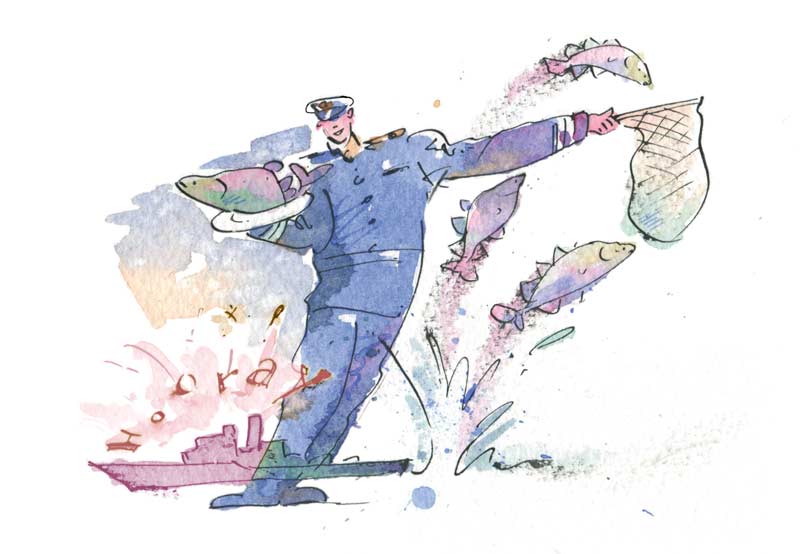
Illustration by Malcolm Jones
The corvettes of the Second World War were tough little vessels, but their trappings were primitive. Fresh food typically ran out after a few days, leaving crews to dine on things like red lead (canned tomatoes) and bacon. When bad weather made cooking impossible, they turned to canned sardines and hardtack. One veteran said he and his mates were always hungry, usually seasick and obsessed with the idea of getting ashore for a square meal.
One captain, though, devised a way to improve the diet. While passing through the Grand Banks en route to St. John’s, Nlfd., the skipper dropped a single depth charge. In moments, the ship’s boat was recovering dozens of stunned codfish from the water. The crew dined that night on fresh fish, with second and third helpings if desired.
At the start of the First World War, Canadian soldiers were armed with the Ross rifle, a Canadian-made, .303, bolt-action weapon. It was great for both snipers and civilian hunters, but it was not made for the rough and dirty world of the trenches. Exposed to mud or dirt, it tended to jam.
In battle, Canadians could find themselves having to kick or hammer the bolt open. And as a bonus, it was possible to disassemble the bolt and put it back together incorrectly, so it would not lock and, when the rifle was fired, it would fly back into the shooter’s face. Needless to say, the soldiers hated it and took every opportunity to ditch it and pick up a discarded British Lee-Enfield.
The Canadians even had a song about their rifle:
Roamin’ in the trenches,
Ross rifle by my side,
Roamin’ in the trenches,
Couldn’t fire it if I tried.
It’s worst than all the rest,
The Lee-Enfield I like best,
I’d like to lose it,
Roamin’ in the trenches.
The tale of the Stadacona shovel stretches more than 30 years and involves at least three navies and a lot of ingenuity. The story starts with a sod-turning ceremony for a new chief and petty officers’ mess at HMCS Stadacona in Halifax in 1963. The ceremonial shovel was then ensconced in a display case on the base, where it was expected to stay.
Within months, however, the crew of the Royal Navy submarine Alderney snatched it and hung it up in HMS Dolphin, the submarine base at Portsmouth, England.
About six months later, HMCS Athabaskan called at Portsmouth. The chiefs and petty officers had already had their orders from home: “Bring back the shovel.” They staffed a clandestine op, retrieved the shovel and restored it to its rightful place at Stadacona.
A year later, it disappeared again, to resurface at HMS Dolphin. For more than three decades, the shovel was a modern Moby Dick, sought by submariners and surface warriors alike. At various times, it had to be retrieved from Germany, New Zealand, Australia and the U.S. By 1992, it had acquired three dozen or so plaques to memorialize its travels.
The Submariners Association of Canada has kept track of the shovel and its plaques. Among them:
“Filched by the Royal Navy’s special breed of birds ‘The Wrens’ from HMAS Platypus on Sept. 8, 1985,
Association of WRENS, Sydney Branch.”
“Seized through trickery and daring by Flynn and Riley, CPOs of USS Skipjack (SSN 585) U.S. submarine base, Groton, Ct., 14 March 1988.”
“Stolen back from rotten Groton,
April 24, 1988.”
One of its last travels was recorded in 1993, when it returned home again from Australia and, as best determined, it now lies safe in the Naval Museum of Halifax.
A former Canadian naval officer recalls a time in 1940 when he was loaned to the Royal Navy and sent to a course at HMS King Alfred, a training base near Brighton, England. One evening, a lieutenant from the establishment had some reason to speak only to the British students and he tried to dismiss the rest: “Fall out the Colonials.” A group marched away, but the Canadians never moved. The officer shouted: “Fall out the Colonials.” The Canadians stood fast. The officer looked puzzled: “Did you hear me?” The reply came from the senior Canadian in one of the classes: “Yes, but we’re not fucking Colonials.” Point taken and thereafter, the Canadians were never addressed as Colonials.
Advertisement




















